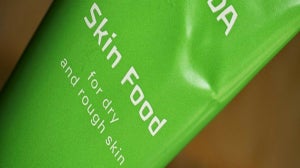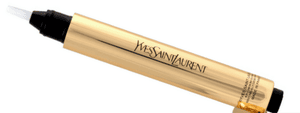
If you suffer from dry, sensitive skin, you’ll know first hand just how infuriating it can be to find skincare products that treat your problem areas without creating new issues. We’ve tried every miracle cream and holistic solution going, from a daily dose of fermented goats milk to DIY oat scrubs. But, after a lot of experimentation, trial and error, and a fair share of tears, we’ve identified the five essential skincare product types for dry, sensitive skin. Although the products themselves will depend on your unique skin needs, your skin will look and feel more hydrated by including these core five steps in your daily routine.
Invest In A Quality Serum

We wish we could tell you about an all-in-one moisturiser that could provide day-long hydration without sitting heavily on the skin. While those with mild dryness may be in luck (check out our moisturiser recommendations below), those with more problematic skin will find that moisturiser alone just won’t cut it.
Give your skin the boost it needs by applying a quality serum daily under your moisturiser. The right serum will draw moisture into your skin, giving you the long-lasting hydration your skin craves. Choose a serum that contains a super-hydrating ingredient, such as hyaluronic acid, cica or squalene, for best results.
Hyaluronic acid, in particular, is ideal for dry, sensitive skin as it has amazing water retentive properties. Drawing moisture from the air, it can hold almost 1000 times its own weight in water. With a gel-like consistency, it absorbs quickly and a little goes a long way, making it a firm favourite in our book.
Make Your Moisturiser Count

Now, at the risk of preaching to the choir, daily moisturising is a crucial part of any dry skin routine. However, not all moisturisers are created equal. If you’re still on the hunt for that perfect moisturiser that keeps flakes at bay without giving you a greasy gleam, here’s what to look out for.
Dry skin will benefit from a slightly heavier formulation as these tend to be longer-lasting, meaning you won’t need to reapply throughout the day. Look for moisturisers that include words like rich, intensive or gel and feature ingredients that nourish, protect and soothe dry skin. A few of our favourites are:
Vitamin E - a fat-soluble antioxidant and anti-inflammatory, great for sensitivity.
Grapeseed Oil - lightweight and quickly penetrates the skin to hydrate deeply.
Urea - locks in moisture and encourages dead skin cells to drop off.
CBD - an anti-inflammatory that reduces redness and irritation.
Top Tip: If your moisturiser comes in a pot, get into the habit of scooping what you need with a small tool instead of your fingers. This avoids introducing bacteria into your moisturiser, which could further irritate your skin.
Cleanse Away The Day

We’re all guilty of forgetting to cleanse after a long day, but it’s such an essential step for dry and sensitive skin. Even the best moisturiser leaves a residue on your skin, which can attract dirt and pollution over the day. Using a mild cleanser can remove any nasties that may be lurking and give you a clean base for your night-time routine.
We like oil-based cleansers for dry skin, as they clean without stripping moisture. Look for cleansers that describe themselves as gentle, soothing or calming, as these will usually be well-tolerated by sensitive skin types. You may also want to avoid cleansers that include drying alcohol.
Drying Alcohols: Ethanol, Isopropyl Alcohol, Alcohol Denat, Methanol
Skin-Friendly Alcohols: Cetearyl Alcohol, Stearyl Alcohol, Cetyl Alcohol, Behenyl Alcohol
For best results, use your cleanser again in the morning to remove an overnight residue before starting your daytime routine.
Exfoliate Away Those Dry Areas

Improving the appearance of dry skin takes a two-pronged approach. It’s not enough to add hydration and hope for the best; we need to actively remove any rough, dry patches too. We can’t stress enough how much of a difference can be made to dry skin by regularly using an exfoliator.
The two main types of exfoliator are chemical and physical. While physical exfoliants use pumice or jojoba beads to buff away dead skin cells, chemical exfoliants break down the bonds that hold dead cells to the surface.
While BHAs (beta-hydroxy acids) are the most hard-hitting of the chemical exfoliants, penetrating deep into pores, they’re generally too harsh for dry and sensitive skin types. AHAs (alpha-hydroxy acids) on the other hand, are a great acid to integrate into your routine.
Of the three main AHAs - glycolic, lactic and citric acid - we recommend starting with a lactic acid exfoliator, which is gentle enough for sensitive skin and will still give you great results, leaving your face smoother and more radiant. Glycolic acid is a stronger acid which many dry skin sufferers eventually graduate on to, but is best avoided completely if you suffer from rosacea or other skin irritable conditions.
Relax and Replenish

Your skin repairs itself overnight, so support the process with a night moisturiser to give it a fighting chance while you sleep. At this step, we recommend opting for the heaviest texture you’re comfortable with, as a thicker layer of moisturiser will ensure your skin can continue to absorb nutrients throughout the night.
You might also choose to apply your serum first, but it’s not strictly necessary as night moisturisers may already contain some of the same ingredients. That being said, many people swear by applying a facial oil under their night moisturiser, particularly something rejuvenating such as rosehip oil.
Ultimately, you can make this final stage of your skincare routine as simple or as complex as you want it to be, but always, always apply that final layer of moisturiser before bed. Trust us, it makes a world of difference.








